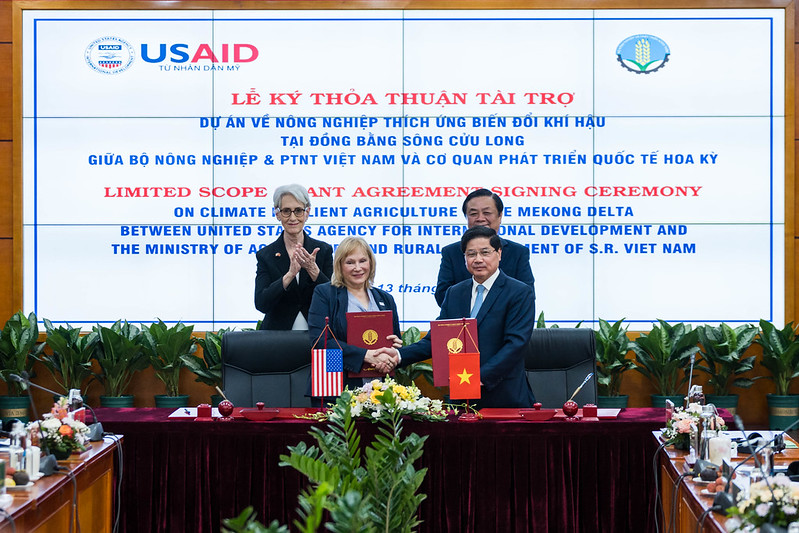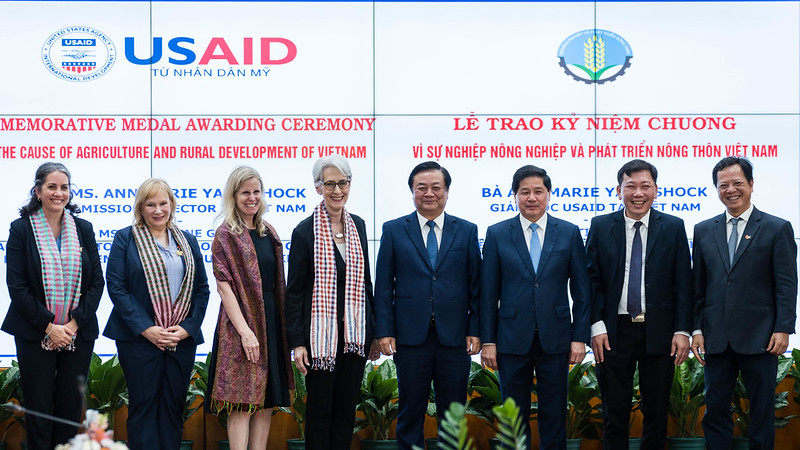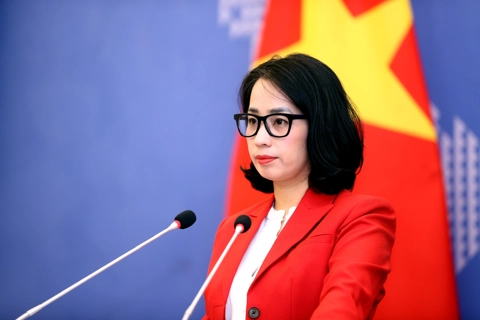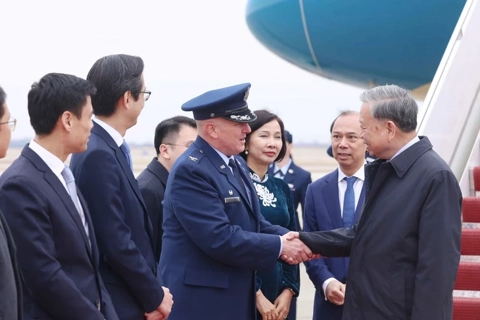USAID helps save threatened species in Vietnam
The five-year project will promote Vietnam’s leadership by enhancing the government’s commitment to reducing the demand and consumption of illegal wildlife products.
Threatened species in Vietnam would be better saved in a new project worth US$15 million launched today [June 13] in the support of the US Agency for International Development (USAID).
| USAID/Vietnam Mission Director Ann Marie Yastishock and Vice Minister of Ministry of Agriculture and Rural Development (MARD) Le Quoc Doanh sign the agreement with the witness of US Deputy Secretary of State Wendy Sherman and MARD Minister Le Minh Hoan. Photo: USAID |
Speaking at the launch of the five-year project held in Hanoi, USAID/Vietnam Mission Director Ann Marie Yastishock said under the project, her agency will work with MARD to reduce the demand for and consumption of illegal wildlife products, and save our threatened species.
She said threatened species, which are the world’s most iconic endangered species, including rhinos, elephants, pangolins, and tigers, will perish from the planet within the next decades at current rates as experts predicted.
The project, called “Saving Threatened Wildlife”, helps Vietnam control the increasingly serious wildlife trafficking situation by promoting Vietnam’s leadership in addressing wildlife crime by enhancing the commitment of Government leaders at the national and provincial levels, improving law enforcement effectiveness, and reducing demand and consumption of illegal wildlife products.
According to Le Quoc Doanh, the Vice Minister of MARD, the effective implementation of the Saving Threatened Wildlife project will help address the issue of illegal wildlife trafficking, and therefore reflect the highest commitments of the Government of Vietnam in this effort, contributing to biodiversity conservation and environmental protection in Vietnam.
Vietnam remains a global hub of the illegal wildlife trade and is a major destination, origin, and transit country in the illegal trade supply chain. The new project focuses on protecting species that are at risk from international trafficking into Vietnam such as African rhinos, African and Asian elephants, and pangolins, as well as animals that are regularly poached and traded domestically or internationally, such as primates, muntjacs, and big cats.
The project is implemented by World Wide Fund for Nature, in cooperation with TRAFFIC and Education for Nature﹘Vietnam (ENV).
| Delegates at the ceremony. |
The Saving Threatened Wildlife project builds and expands on the progress achieved by USAID’s previous five-year (2016-2021) project, Saving Species. The Saving Species project supported the Government of Vietnam to improve and harmonize the legal system related to wildlife protection, strengthen law enforcement and prosecution of wildlife crimes, and reduce demand and illegal consumption of wildlife.
The Saving Species projects led to significant results. A survey indicated that recipients of the communications campaign messages are less likely to buy ivory, rhino horn, and pangolin products than they were prior to the campaign. Among high income earners, the percentage of buyers of ivory decreased from 16% in 2018 to 9% in 2021; and the percentage of buyers of rhino and pangolin products decreased from 8% in 2018 to 6% in 2021.
Limited Scope Grant Agreement signed
Also at the project launch, USAID and MARD signed the first bilateral partnership agreement called a Limited Scope Grant Agreement on climate change cooperation in the Mekong Delta for the period 2022 to 2027, opening a new chapter of cooperation on environmental issues.
Costing an estimated budget of up to $50 million, the agreement will enable USAID to help MARD in reducing methane emissions from the agriculture sector, building resilience for the Mekong Delta’s vulnerable populations, promoting nature-based solutions, and developing climate-resilient and low-emissions policies.
Sharing at the signing ceremony, Wendy Sherman said she wanted USAID and MARD to work together on helping the people of the Mekong Delta region adapt to the changing climate and reduce agricultural emissions.
“Addressing the climate crisis must be a collective effort, and it must incorporate everything from building environmental resilience, to reducing emissions, to conserving biodiversity,” she said, adding that the US is proud to be Vietnam’s partner in this effort.














